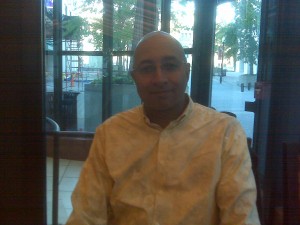LISTEN TO JOHN GLOSTER
Audio clip: Adobe Flash Player (version 9 or above) is required to play this audio clip. Download the latest version here. You also need to have JavaScript enabled in your browser.
Ten years ago, what was then Ward 8’s only supermarket was closed. Members of the D.C. Statehood Green Party responded by starting their own market. Ten years later, the Ward 8 Farmers’ Market is still going strong and leading the way in finding innovative approaches to providing fresh produce to the food desert that is southeast Washington, D.C.
In two recent editorials, the Washington Post encouraged D.C. voters not to limit themselves to voting for Democratic candidates, but instead to consider voting for D.C.’s second politcal party which, according to the Post, is the Republicans. John Gloster, one of the founders of the Ward 8 Farmers’ Market and a member of the D.C. Statehood Green Party, responded: “Here’s the deal: the D.C. Statehood Green Party, we call ourselves the second party. The Republican Party is the third party in the District of Columbia. You look at the number of votes we get in elections the last few cycles, it bares that out. We’ve been out-voting the Republican Party.”
Gloster continued, “We stand more in line with the values and the needs of the people of the District of Columbia. For that very reason, we are intentionally excluded from media coverage by organizations conservative in nature like the Washington Post because we represent more of a threat to the power structure than the Republican Party, if you think about it. Because we are more in line with the average citizen of the District of Columbia there’s more of a potential of our becoming first party, and that would totally upset the power structure right now. Right now, if Republicans became somehow magically in power in D.C. not that much would change when you look at the way in which the city is run… for the wealthy and for the large corporations. So the Republicans being in power, the Democrats being in power, that wouldn’t change that much. Statehood Green, that would be like a revolution. So therefore, it’s very important to organizations that tend to protect the status quo to make sure that the Statehood Green Party is marginalized.”
Not only has the D.C. Statehood Green Party kept the Ward 8 Farmers’ Market going for ten years, but it has launched a creative new initiative called “the buyback program.” This initiative provides farmers with $250 a week in guaranteed sales, apart from their sales to individual customers. The produce from “the buyback” is distributed to local feeding programs, as well as to corner stores. Yes, corner stores, which have historically sold less-than-healthy items, are now selling fresh produce in southeast, D.C.
Gloster explained the initiative, “During the six-months that we operate, the corner stores provide an avenue through which produce can be obtained throughout the week or until what we give them sells out. I do find though that the typical purchaser from the corner store is not necessarily the typical purchaser from the farmers’ market. A lot of the people who are buying produce from the corner stores do not appear to have ever gone to the market, and so we’re reaching also another type of consumer, one who doesn’t necessarily think [the] farmers’ market is a place that they would logically be going to, but yet and still they’re buying farmers’ market produce through the corner stores.”
Getting the corner store owners to buy into the program wasn’t easy, said Gloster, “Well, you know, [they had] a little bit of skepticism, as you might think. But because of the fact that we have the grant and are able to subsidize it, the corner store owners…, [the] three of them that we operate with, were willing to take a chance. And even though it’s subsidized, it’s still a chance for them because every inch of space in a store is a potential profit center. So taking a portion of your space and using it for that [when] you could be selling yet more, whatever, gummy bears… or cigarettes or whatever else it might be. So that has opened up an avenue and we’d ideally like to see that replicated and see more corner store owners see the potential for selling produce in their stores.”
Gloster said, “I think it’s worked quite well. For instance, I remember strikingly the first time that it really sunk home. We had delivered watermelons on one particular Saturday and when we came back the next Saturday it seemed to be the same number of watermelons and so I remarked to the store owner, who was there, ‘Oh, you didn’t sell any watermelons.’ He said, ‘No, quite the contrary. We sold out of your watermelons about mid-week and so people were complaining that there were no more watermelons so we bought more from another supplier.’ And he looked at me, I guess to see if I would be upset by that. And of course I was delighted because that’s exactly what we wanted, for the corner store owners to see that there is potential demand for these products and they’ll eventually be able to acquire them for themselves.”

